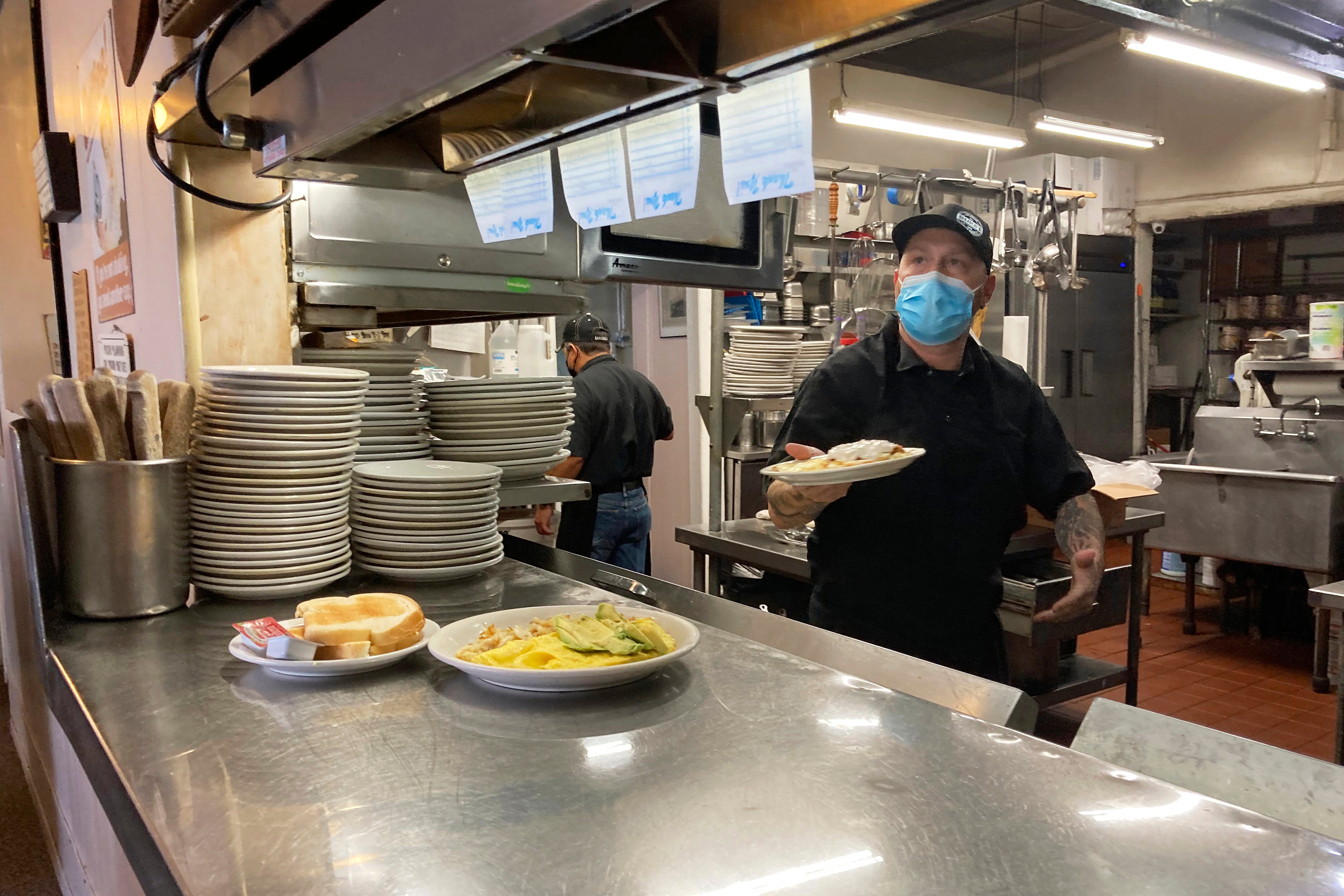Some San Diego restaurants reopen despite legal uncertainty
Restaurants in California's second most-populous county face a difficult choice whether to reopen after a judge's order exempted them from the state's stay-at-home order limiting them to takeout and delivery service

Eggs, waffles and burritos flew out of the kitchen Friday at The Old Townhouse, a 45-year-old institution in San Diego's Ocean Beach neighborhood that immediately resumed indoor dining when a judge cleared the way for restaurants in the state's second-largest county to ignore Gov. Gavin Newsom s stay-at-home orders.
“That's a powerful statement,” owner Ted Caplaneris repeated as he plucked lines from his creased printout of Superior Court Judge Joel Wohlfeil's ruling and read them aloud.
Other eateries in the neighborhood known for their laid-back surfer vibe remain closed, illustrating the difficult choice facing restaurants as they weigh whether to reopen for what could be a short reprieve.
Newsom immediately appealed after a brief hearing Thursday in which the judge clarified that his ruling a day earlier applied to all restaurants in San Diego County, not just the two strip clubs that serve food and sued in October.
The ruling allows restaurants to establish their own safety protocols. “San Diego County businesses with restaurant services” are exempt from shutdowns and “any related orders” and must abide by protocols necessary to control the spread of COVID-19, the judge said.
It was the biggest victory yet for California businesses fighting health orders they say have crippled them financially, though a setback on appeal could quickly force them to close again after stocking up on food and bringing back staff just before Christmas.
The decision to reopen was easy for The Old Townhouse, which spent more than $5,000 on safety measures including plastic shields between indoor booths and tents on the neighborhood's palm tree-lined commercial drag for outdoor seating.
“It was a great relief because I have a hard time paying the mortgage and paying my bills,” said Caplaneris, who heard from industry contacts that larger restaurants and chains are less likely to reopen because it involves more planning and preparation.
The family-owned business pays no rent and reopened with a “skeletal crew” only during prime hours of 9 a.m. to 1 p.m., Caplaneris said. Business is still only about 25% of normal.
Some restaurants will reopen only for outdoor dining, said Miles Himmel, spokesman for county Supervisor Jim Desmond, who opposes state restrictions. Others are reluctant to do anything before the appeal is decided.
Hours after the injunction was issued, officials suspended enforcement of restrictions barring indoor and outdoor dining and live entertainment in the county of 3 million people.
Wohlfeil said the state failed to show restaurants and strip clubs contributed to the spread of the virus or shortage of hospital beds.
“These business establishments provide sustenance to and enliven the spirits of the community, while providing employers and employees with means to put food on the table and secure shelter, clothing, medical care, education and, of course, peace of mind for they and their families,” he wrote.
County Supervisor Nathan Fletcher said Friday that the ruling was “fundamentally wrong” and could be a devastating blow “at a point where we are entering our darkest days and darkest hours.”
San Diego Mayor Todd Gloria said Thursday that the city was working closely with the state to understand the implications.
“No one wants our small businesses to be closed, but the science and data are showing a dire trend in hospitalizations and deaths,” Gloria said.
California registered 300 coronavirus deaths and more than 41,000 new confirmed cases Friday, shy of a record 379 deaths and more than 52,000 new cases Thursday.
Notorious Burger owner Brian Gruber said he felt like he was giving an early Christmas gift to his employees when he called them back to work.
Business thrived as diners returned to his mobster-themed eatery in the beach city of Carlsbad, up 200% from the previous week when his restaurant was restricted to takeout and delivery services.
“I’m hoping for some sort of sanity in the system,” Gruber said as he prepared for a second-day of on-site dining at his restaurant, which leaves doors open and requires patrons to wear masks and socially distance as they eat indoors and outside.”
In his ruling, the judge noted that before being ordered to close in October, the two strip clubs that sued — Cheetahs Gentlemen’s Club and Pacers Showgirls International — operated for five weeks under their own safety measures, including keeping strippers 15 feet (4.6 meters) from tables, allowing no more than one stripper per stage and requiring them and other employees to wear masks.
___
Associated Press writer John Antczak in Los Angeles contributed.
Bookmark popover
Removed from bookmarks